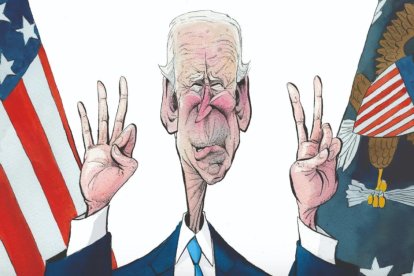Facebook censors 'The Spectator' cover satirizing Joe Biden
The British conservative magazine has not received a conclusive response from the social network as to why it has canceled the publication.

Portada de The Spectator.
Facebook has censored a cover of the British magazine The Spectator. Fraser Nelson, the editor of the weekly, has explained in an article the circumstances of the censorship by Mark Zuckerberg's social network.
This is not the first time that The Spectator has used humor to deal with political news:
A Kafkaesque process
The magazine asked Facebook for a review of the case but was refused. It did so again, and the social network sent The Spectator a message stating: "You asked for another review of your rejected ads. After another review, it's been determined that they still don't comply with our Advertising Policies."
Fraser Nelson comments:
And the matter is of the utmost importance, given that in his opinion
Fleeting and ineffective intervention by Alex Belardinelli
At that impasse, Fraser Nelson tweeted about the Facebook censorship case, and the issue gained increasing interest in the British press. A journalist from The Sun newspaper called him and informed him that Facebook had rejected the cover because it had not been uploaded by someone authorized.
But it seems somewhat contradictory since the media are exempt from such procedures. And The Spectator is a well-known medium: The weekly, which has been published in Great Britain since 1828, has a circulation of about 100,000.
As the issue was gaining a great deal of press interest, Nelson was contacted by Alex Belardinelli, Director of Communications for Northern Europe. Belardinelli reacted by thanking him for drawing attention to the matter as if it were an unintentional mistake. And invited him to reapply for publication:
Nelson is surprised, because the reason that Facebook had alleged had to do with the publication itself, not with the person authorized to request its publication. But after this invitation, the magazine repeated the operation. But it was again rejected, without further explanation.












